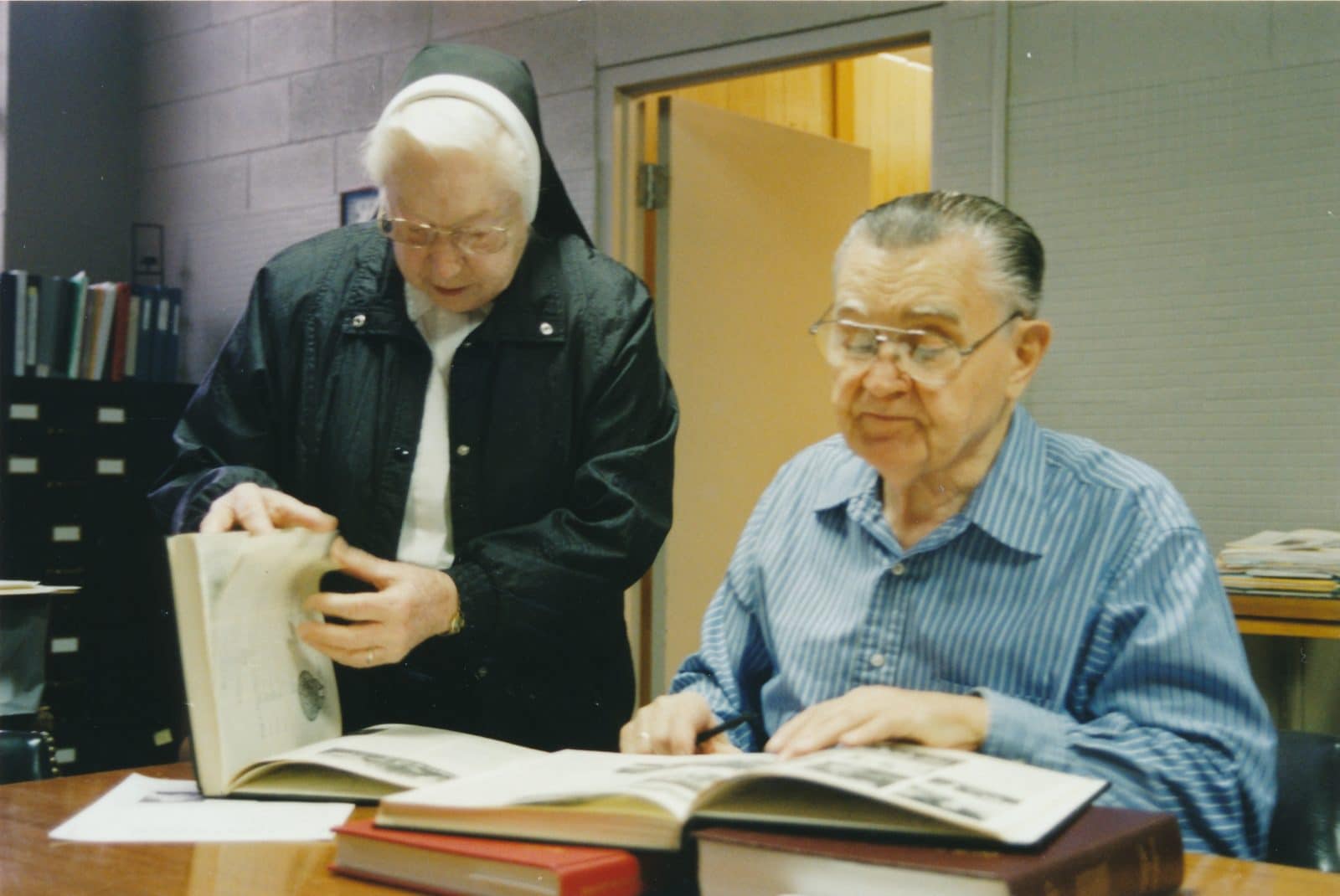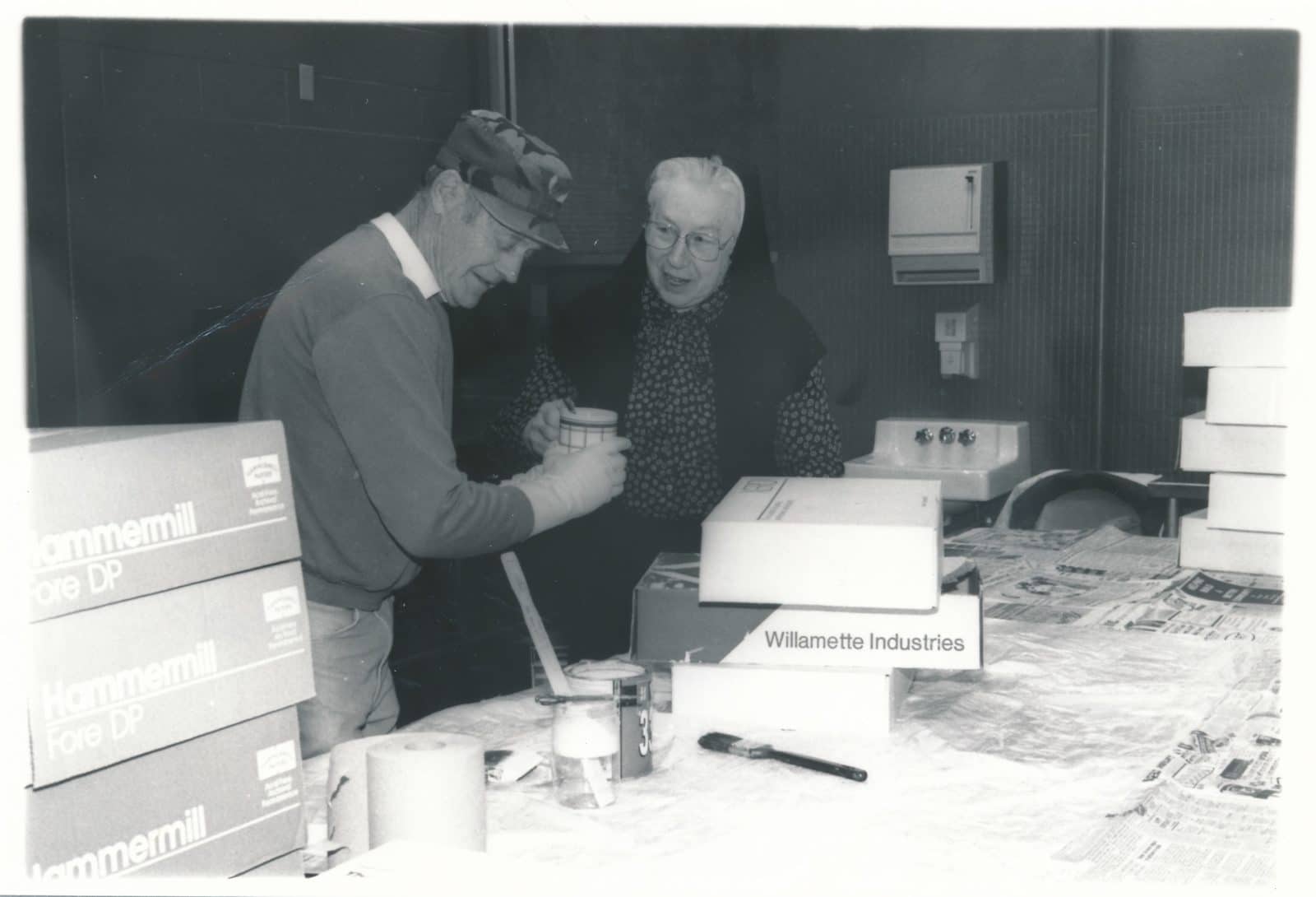
Background
In 1976, the Committee for the Bicentennial National Conference of Catholic Bishops published a document on ecclesiastical archives that urged each bishop who did not already have a diocesan archivist to appoint one. Seventeen years later on March 25, 1993, Pope John Paul II established the new Pontifical Commission for the Cultural Heritage of the Church. At the same time, he urged all dioceses and religious congregations to make a greater effort to preserve their heritage. The next year on March 19, 1994, the Commission published a circular letter to call attention to the importance of libraries and archives, and their role in the mission of the Church.
Another circular letter, “The Pastoral Function of Church Archives,” was distributed by the Commission on February 2, 1997. It described archives as “places of Church memory which must be preserved, transmitted, renewed and appreciated because they represent the most direct connection with the heritage of the ecclesiastical community.” This letter also stated that “preservation is a need that we today justly owe to those who have gone before us. Showing disinterest would be an offence to our ancestors and their memory…In time, archives assume a universal destination, because they become the heritage of all humanity.” The Commission recommended that dioceses and religious congregations gather all their materials in one place, and have it studied and made accessible to researchers.
Founding Archivist
In January 1991, Bishop John J. McRaith appointed Sister Emma Cecilia Busam, OSU, (1921-2019) as the first archivist for the Diocese of Owensboro. Remembering the early days of the Archives, Sister Emma Cecilia wrote:
In December 1989, I was attending a funeral Mass at Sts. Joseph and Paul Church in Owensboro at which Bishop John J. McRaith was celebrant. On leaving the church, the Bishop came to the pew where I was and asked if Father John Vaughan had said anything to me. When I replied no, he added, “He will soon,” and then returned to the recessional procession. Soon after, Father Vaughan called and asked me to come to the chancery and talk about archives. After exchanging ideas about the job, he invited me to become the archivist for the Diocese.
Sister Emma Cecilia served as archivist for the Diocese of Owensboro for 20 years, setting up the office and collecting records for the archives. For a time, she worked as part-time archivist for the Diocese as well as full-time archivist and museum curator for her community, the Ursuline Sisters of Mount Saint Joseph in Maple Mount, Kentucky.
In 2003, Sister Emma Cecilia resigned from the Mount Saint Joseph Archives and Museum to devote more time to the diocesan archives. She worked with many volunteers from the local community to organize and rehouse records. Two years later in 2005, Sister Emma Cecilia applied for a National Endowment for the Humanities (NEH) Grant for Small Archives to buy much-needed archival supplies. The NEH awarded the diocesan archives a $5,000 grant in January 2006, which made possible the purchase of shelving, flat files, acid-free boxes and folders, and other supplies. Also in 2006, the diocesan archives expanded into an additional room to store the growing number of collections in its holdings.
On February 16, 2011, Sister Emma Cecilia officially retired from the Diocese of Owensboro Archives. In her notes in preparation for a meeting with Bishop William F. Medley shortly before her retirement, she wrote:
I have learned a lot. For this I am grateful. I feel I have gotten closer to God…I hope it has all been for the honor and glory of God and the salvation of souls.
Lay Archivists
In 2011 the Diocese of Owensboro hired Sarah Ater (then known as Sarah Patterson) as the first lay archivist for the diocese. She was also the first lay archivist for the Ursuline Sisters of Mount Saint Joseph. Sarah was responsible for drafting the first records retention schedule for the diocese, which outlines which types of records should be kept and how long they need to be maintained. She also authored a book celebrating the diocese’s 75th anniversary, Freely You Have Received, Freely Give: 75 Years of the Diocese of Owensboro Kentucky. In January 2015 Sarah left the Diocese of Owensboro to accept the position of archivist for the Archdiocese of Cincinnati.
In March 2015 the Diocese of Owensboro hired Heidi Taylor-Caudill as the second lay archivist for both the diocesan archives and the Mount Saint Joseph archives. One of Heidi’s earliest goals was to “break open” each archives, transforming the perception of the archives as solely storehouses of records into awareness of them as vital, usable resources for collective memory. She concentrated on finding creative ways to share the history of the Catholic Church in western Kentucky with the general public through social media, online resources, newspaper articles, and special events. Examples of her work include an interactive map showing locations of Catholic cemeteries across the diocese, a concert honoring the founder of Mount Saint Joseph Academy that mixed musical performances with readings from archival documents, and the launch of the diocesan archives’ Twitter account @OboroArchives. Heidi also implemented both archives’ first collections management system, PastPerfect, which allows staff to organize, control, and manage objects in the collections by tracking all information related to and about those objects. She later published the first online collections catalogs for both archives (diocesan archives site; Mount Saint Joseph site), enabling users to browse and search items in the collections from anywhere in the world. In November 2019 Heidi left the Diocese of Owensboro to accept the position of museum curator with John James Audubon State Park in Henderson, Kentucky.

